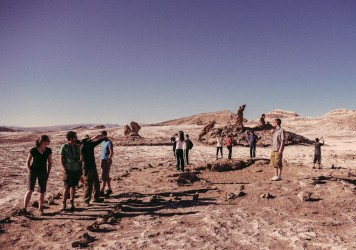Master doc maker Patricio Guzmán returns with a stunning look at our destructive relationship with Earth.
Patricio Guzmán’s cinema travels through time and space with the seamless ease of a whisper. Humanist and historical, intergalactic and elemental, his films are deceptively dense. One moment could be mired in the trauma of Chile’s dictatorial Pinochet era, and the next ascending to the heavens or dipping underneath the water’s surface. Malleability remains a crucial component for a filmmaker working so thoroughly in the cross section between national history and personal memory.
After spending Nostalgia for the Light stargazing with astronomers and scouring the Atacama Desert looking for the bones of Chile’s “disappeared,” Guzmán ventures into the lush and isolated terrain of Western Patagonia in The Pearl Button to examine the region’s relationship with water and its violent history involving displaced indigenous tribes. Striking aerial shots help contextualise the scope of massive estuaries and island chains that reach endlessly outward for thousands of miles. Archival photographs of Patagonia’s native tribes segue into a greater discussion about mankind’s destructive relationship with Earth.
Guzmán’s calm voiceover often provides a lyrical compliment to the potent imagery. Early in the film he remembers hearing raindrops on a zinc roof while visiting the area many decades before as a child. “That sound has followed me my entire life,” he says. The past cannot be shaken, only re-examined and restored with hopes of better understanding what lies beneath.
The Pearl Button also confronts what it means to be Chilean. Guzmán poses this question to the last living descendants of the Patagonia tribes as well as a selection of poets, engineers, astronomers and artists. Their knotty answers are organically tied to the compromise of human rights and dignity that has come to define Chilean “progress”.
Not much differentiates the barbaric acts of settlers decimating native tribes in the 1880s and Pinochet’s military dictatorship that came to power through a violent coup d’état in the 1970s. The latter produced a myriad of horrors, including the mass execution of academics, educators, and political allies of deposed President Salvador Allende. One particularly gruesome trend involved attaching steel rails to bodies and dropping them by helicopter into the ocean.
When Guzmán decides to reconstruct the last moments of one such victim, he’s combatting the impunity revolving around Pinochet’s actions “so the dead can finish dying.” The Pearl Button intertwines multiple stories hoping to reconcile long-gestating pain with the habit of turning a blind eye to government wrongdoing. Guzmán’s deep connection with the environment tempers any heavy-handedness, as for him it’s about physical details and humbling wonder.
A 3,000-year-old droplet of water lies dormant in a gorgeous piece of quartz. The film’s opening image remains a staggering time capsule of endurance, but also embodies the layered texture of time periods in suspended overlap. There are similarly impressive thematic markers throughout The Pearl Button, including a map of Chile made by artist Emma Malig on warped cardboard. If “water has its own language,” as anthropologist Claudio Mercado says, so too does Guzmán as a filmmaker. His work speaks to the past and present, the living and the dead with equal resolve, lingering on the seemingly small details of memory that allude to so much more.
Published 18 Mar 2016
How does one follow up the masterful Nostalgia for the Light?
A sobering, lyrical essay film on Chile’s various physical and emotional surface areas.
Grows in magnitude and importance with each passing day.

Joshua Oppenheimer’s bloodcurdling and brilliant follow-up to his doc smash, The Act of Killing.

By Carmen Gray
A stunningly original, poetic yet unpretentious film about astronomy and the trauma of military dictatorship.